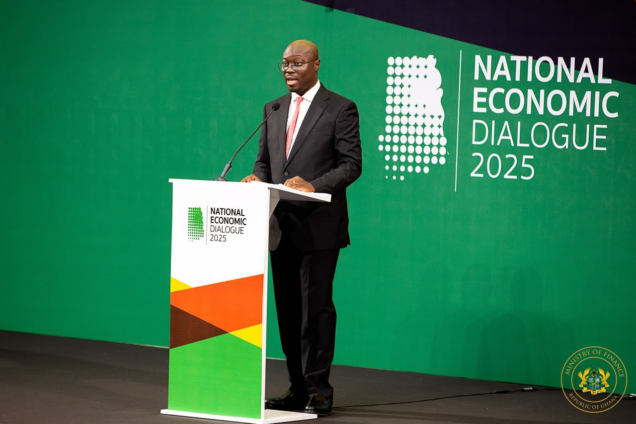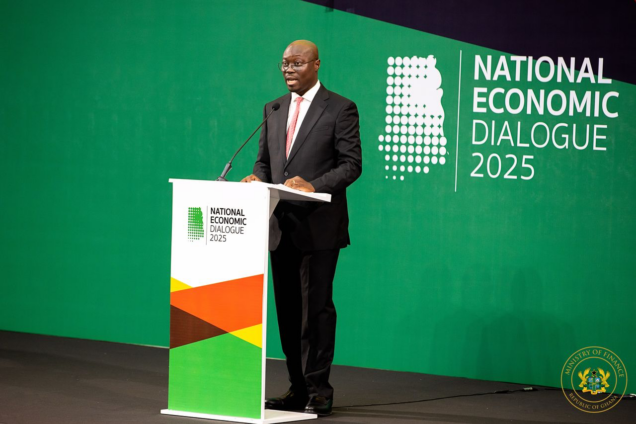Ghana’s 2025 Economic Outlook: What It Means for Citizens and the Diaspora
The Ghana economy 2025 stands on a knife’s edge — balanced between recovery and relapse. After years of painful inflation, unstable Cedi rates, and reliance on IMF bailout programs, cautious optimism is finally returning to Ghana’s markets and households.
In the bustling Makola Market in Accra, traders are beginning to smile again. Tomatoes that once sold for ₵50 per bowl now cost ₵35, and transport fares have eased slightly after months of relentless increases. Yet, beneath the surface relief, one question still echoes across homes and businesses:
“Will the Ghana economy 2025 truly bring change?”

According to the Ghana Statistical Service (GSS), GDP growth is projected at 4.2% this year, driven by agriculture, digital finance, and oil exports. But while these figures look promising on paper, the true test lies in how the recovery affects real life — from market prices and salaries to remittances flowing in from the diaspora.
2024 Recap -The Struggle Before the Stability
Last year was one of the most trying in recent memory. Inflation peaked above 30%, eroding purchasing power and leaving millions struggling to afford basic necessities. The Cedi plunged to its lowest point in years, and fuel prices fluctuated almost weekly.
Yet, by late 2024, there were glimmers of hope:
-
The Cedi stabilized around ₵12.50 per US dollar.
-
Cocoa exports – Ghana’s economic backbone — reached a five-year high, buoyed by strong global demand.
-
The Bank of Ghana’s decisive monetary tightening began to bear fruit, slowing inflation and rebuilding confidence in the currency.
The IMF’s latest report has praised Ghana’s economic stabilization efforts and the recent Cedi appreciation, noting that confidence is gradually returning to the financial markets. However, the Fund projects a 4% GDP growth for 2025, slightly below the government’s target, and cautions that persistent global uncertainties, rising debt costs, and commodity price volatility could slow Ghana’s recovery momentum
2025 Economic Predictions: The Year of Gradual Rebuilding
Experts project moderate but steady growth across multiple sectors. Here’s what analysts and institutions are forecasting:
| Indicator | 2024 | 2025 Projection |
|---|---|---|
| GDP Growth | 3.5% | 4.0 – 4.5% |
| Inflation | 29% | 8 – 10% |
| Cedi-Dollar Rate | ₵12.50/$ | ₵11.8 – ₵12.6/$ |
| Interest Rate | 29% | Likely to ease by mid-year |
| Unemployment Rate | 13% | Expected decline |
Sectors to Watch
-
Agriculture: Expansion in cocoa, cassava, and cashew exports.
-
Fintech & Digital Finance: The eCedi pilot is expected to expand nationwide.
-
Tourism: Increased diaspora travel during the Year of Return revival initiatives.
-
Green Energy: Government incentives aim to attract solar and renewable energy startups.
According to a Bank of Ghana report released in January, foreign investor confidence is returning gradually, particularly in fintech, mining, and real estate.
How the Economic Forecast Affects the Average Ghanaian
Ghana Inflation 2025 and Food Prices
With inflation easing from its 2024 highs, food and transport costs are expected to drop slightly. While full relief might not arrive until mid-2025, stable Cedi rates could help slow further price hikes in local markets.
Jobs and Salaries in the Ghana Economy 2025
Growth in logistics, fintech, and energy sectors is forecast to create new employment opportunities. The government has hinted at public-sector salary adjustments if inflation remains under control a sign of gradual improvement for middle-class families.
H3: Rent, Utilities, and Cost of Living Trends
Rent and electricity bills are projected to stay relatively steady through the first half of 2025. However, experts warn that renewed fuel price increases could trigger higher utility charges later in the year.
Hairdresser Afia Serwaa in Kumasi captures the national mood:
“Last year was hard. We lost customers because everything was expensive. If prices stay down and people earn more, business will pick up.”
These stories reflect the difference between Ghana’s economic recovery on paper and its impact on everyday life.
What It Means for Ghanaians Abroad
For the Ghanaian diaspora-especially in the USA, UK, and Canada—the direction of the Ghana economy 2025 carries real financial weight.
Remittances and the Cedi Rate Today Ghana
Remittances remain a vital economic lifeline, exceeding $4 billion annually. A stronger Cedi may reduce the local value of each dollar sent home, but it also signals growing stability and improved investor confidence.
Diaspora Investment and Ghana’s Business Opportunities
Financial analyst Nana Ama Frimpong notes:
“Many diaspora investors are returning to buy real estate, fund startups, or engage in digital trade. Confidence is returning slowly but surely.”
Interest in fintech, agriculture, and real estate is especially high among young professionals in New York, Atlanta, and London — a trend that could further strengthen Ghana’s economic forecast for 2025.
Key Risks and Challenges Ahead
Despite encouraging signals, several threats could stall the Ghana economy 2025 recovery.
Global Oil Price Volatility
As a net oil importer, Ghana remains vulnerable to rising international prices that could raise transport and food costs.
Rising Debt and Fiscal Discipline
Political Uncertainty Before 2028 Elections
Pre-election fiscal loosening may deter investors and weaken confidence in long-term policy stability.
Climate Impact on Agriculture
Droughts and floods threaten key crops like cocoa and maize, underscoring the need for climate-resilient farming.
According to the IMF’s second review of Ghana’s bailout program, fiscal indiscipline remains a top concern, especially during politically charged years.
Key Risks and Challenges
Despite the positive projections, Ghana’s economy faces serious headwinds that could derail its progress:
-
Global Oil Price Volatility: As a net oil importer, rising prices could increase import bills and inflation.
-
Rising External Debt Servicing: Debt repayments remain one of Ghana’s biggest fiscal pressures.
-
Political Uncertainty Ahead of 2028 Elections: Investors may hold back due to policy unpredictability.
-
Climate-Related Agricultural Disruptions: Droughts and floods continue to threaten key crops like cocoa and maize.
The IMF’s second review of Ghana’s bailout program warns that fiscal indiscipline, particularly in an election cycle, could undo recent gains.
Global Context: How Ghana Fits In
In a world struggling with post-pandemic inflation, geopolitical tensions, and supply chain disruptions, Ghana’s performance mirrors many emerging markets.
The World Bank predicts that Sub-Saharan Africa will grow by 3.8% in 2025, with Ghana slightly outperforming that average provided reforms remain consistent.
Neighbouring countries like Nigeria and Côte d’Ivoire are also recalibrating fiscal policies to stabilize currencies, suggesting a possible regional turnaround.
What Experts Are Saying
International attention is growing on Ghana’s potential rebound.
According to Moody’s Investor Service, Ghana’s credit outlook remains stable for 2025, thanks to improved foreign reserves and debt restructuring progress.
Economist Kwame Ofori-Atta told the BBC Africa Business Report:
“What investors want to see is stability, not miracles. Ghana’s direction is correct it just needs policy discipline, anti-corruption enforcement, and structural reforms.”
Meanwhile, small business owners continue to navigate uncertainty. Many cite the high cost of credit as a major barrier, even as interest rates show signs of easing.
Public Sentiment – Hope and Hesitation
On social media, conversations about the Ghana economy 2025 trend daily.
While some Ghanaians praise the government’s efforts to stabilize the currency, others express frustration at persistent unemployment and high taxes.
A popular Twitter post read:
“The Cedi may be stronger, but my pocket still weak.”
This tension between macroeconomic recovery and microeconomic pain remains Ghana’s defining challenge.
Conclusion – Cautious Optimism for 2025
As the Ghana economy 2025 takes shape, one truth stands clear: recovery is happening, but it’s not yet felt by everyone.
The year will test Ghana’s resilience in its leadership, private sector innovation, and citizen patience.
If policies remain steady, inflation continues to decline, and investor confidence holds, Ghana could reclaim its place as one of West Africa’s most dynamic economies.
For both citizens at home and Ghanaians abroad, 2025 offers not just hope — but a reminder that progress, though slow, is finally within reach.








